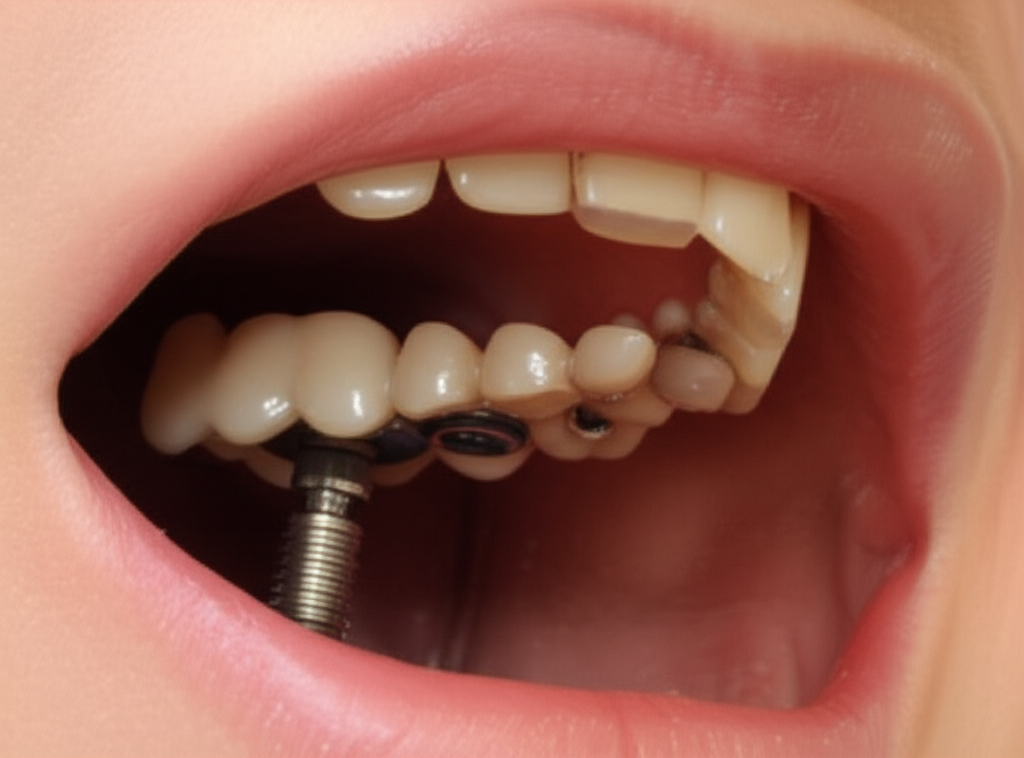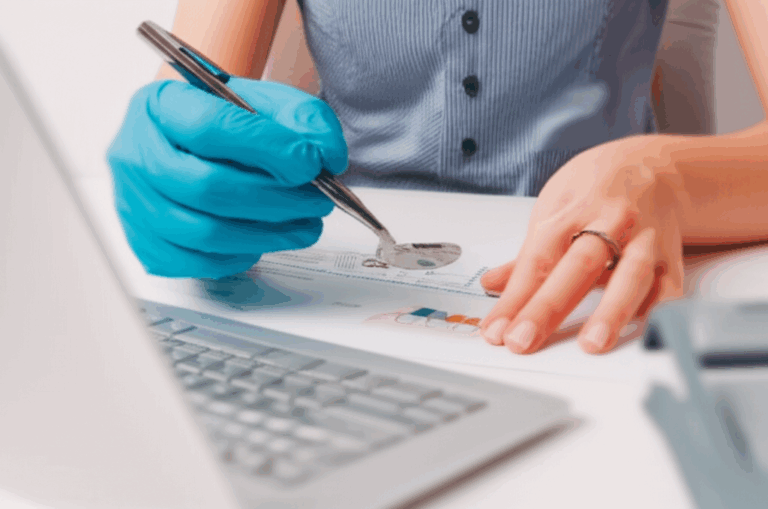
Do Dental Implants Get Infected? Understanding Risks, Symptoms, & Treatment
When it comes to dental implants, many people think they’re safe forever. The truth is, just like your real teeth, dental implants can get infected. In this article, I’ll explain what dental implant infections are, how to catch them early, what to do if you notice a problem, and how to make sure your smile stays looking good for years. If you’re thinking about implants — or already have them — this could be some of the most useful info you’ll ever read.
Table of Contents
What Is a Dental Implant Infection?
Let’s start with the basics. A dental implant is a small screw, usually made from titanium or zirconia, put into your jawbone. It acts like the root of a tooth and holds a crown, bridge, or even a full denture.
But implants can go bad, just like your real teeth. An infection around an implant is called peri-implantitis if both gum and bone are involved — or peri-implant mucositis if it’s just the gum (this one can be turned around). Both are caused by germs (bacteria) getting into places they shouldn’t be.
Key Point:
Peri-implantitis = swelling and bone loss around an implant.
Peri-implant mucositis = swelling just in the gum, no bone loss yet.
Peri-implantitis is like gum disease but for implants. Without help it can get worse, leading to bone loss and even losing the implant.
Can All Dental Implants Get Infected?
Short answer: Yes — any implant can get infected.
Many people think implants can’t get infected because they’re not real teeth. That’s not true! Even though implants are made of metal or ceramic, the gums and bone around them are real — and can get sick.
Here’s why every implant is at risk:
- Implants go into living gum tissue and jawbone.
- Bacteria make biofilm and plaque on implants just like on teeth.
- Not cleaning well or health issues can let infection start.
Infections can happen soon after surgery, or even years later.
Common Types of Infections:
- Early infection: Usually happens in the first few weeks or months after surgery. Normally from germs during surgery or trouble healing.
- Late infection: Can show up years later, usually because of poor cleaning or growing germs.
Fact: Studies show that up to 43% of people with implants get peri-implantitis, and even more will get mucositis at some time (look at the table below).
Table: Dental Implant Infection Statistics
| Problem | How Common? | Can It Be Fixed? |
|---|---|---|
| Peri-implant mucositis | Up to 80% | Usually reversible |
| Peri-implantitis | 12-43% | Yes (if caught early) |
| Total implant failure | Less than 5% | Sometimes, needs removal |
Source: Studies from Derks & Tomasi (2015), Kordbaz et al. (2021)
How Can I Tell if My Implant Is Infected?
It can be hard to tell, especially at first. Implants can look normal from the outside. But if you pay attention, your body gives warning signs.
Early Symptoms
- Red or puffy gums around your implant
- Bleeding when you brush or floss
- Mild soreness or feeling “tender” near the implant
- Bad taste in your mouth or bad breath
- Slight gum puffiness
Advanced Symptoms (Act Fast!)
- Ongoing pain or throbbing at the implant spot
- Pus coming from the gums near the implant
- Gum pulling back (receding) near the implant
- Loose implant or crown that moves
- Bone loss (usually seen on X-rays)
- Bleeding that keeps going
If you see pus, swelling, or the implant feels loose, call your dentist or specialist right away!
Tip: Take pictures of your gums if you see anything odd. This can help your dentist figure out what’s wrong.
Why Do Dental Implants Get Infected?
You might ask: If implants are so fancy, why do they get infected? The answer’s simple — it all comes down to bacteria.
Your mouth has millions of bacteria, some good and some bad. When you let too much plaque pile up, the bad bacteria win. They sneak under the gum, causing infection, swelling, and bone problems.
Main Causes
- Not cleaning well: Not brushing and flossing lets germs grow.
- Plaque and tartar: Hard plaque (tartar) is hard to take off at home.
- History of gum disease: If you lost teeth from gum problems, your risk is higher.
- Smoking: Tobacco makes it easier for germs to harm your gums.
- Badly placed implants: Implants in spots that are hard to clean are more likely to get infected.
- Leftover glue: If glue from a crown gets stuck under the gum, bacteria like it.
Even if you clean well, infections can still happen—especially if you have other health problems.
What Are the Main Risk Factors for Infection?
Certain things make it easier for an implant to get infected. Here are the top causes:
Patient-Related Risks
- Had gum disease before: If you’ve lost teeth to gum trouble before, your risk is much higher — up to 5 times more!
- Diabetes: High blood sugar makes it hard for your gums to heal.
- Smoking: Smokers are 2-5 times more at risk.
- Weak immune system: From medicine or other diseases
- Genetics: Some people just have tricky gums!
Implant/Procedure-Related Risks
- Hard to clean spots: If it’s tough to brush around the implant, problems can happen.
- Leftover glue: Bits of glue from the cap stuck under the gum.
- Too much bite pressure: Biting too hard or putting more weight than the bone can handle.
- Material mistake: Very rare, but sometimes the screw or cap can be faulty.
Table: Main Risk Factors
| Risk Factor | Relative Risk Increase |
|---|---|
| Previous gum disease | 3-5 times higher |
| Smoking | 2-5 times higher |
| Diabetes (not controlled) | 2-4 times higher |
| Poor cleaning | Direct correlation |
Be careful if any of these relate to you!
How Are Dental Implant Infections Diagnosed?
Dentists don’t have a magic way to see infection, so they use experience, tools, and listen to you.
What the Dentist Checks:
Sometimes your dentist will make sure the trouble isn’t from allergies, implant being rejected, or mechanical issues.
Who Figures This Out and Gives Treatment?
A periodontist or oral surgeon is the best for tricky infections, but your regular dentist can find early signs too. Sometimes, a china dental lab can help the dental team see things more clearly with special 3D pictures.
What Happens if an Infection Is Left Untreated?
I can’t say this enough: Don’t ignore signs of infection!
If you leave peri-implantitis or mucositis alone, the bacteria eat the bone holding your implant. The implant gets loose, hurts to bite, and sometimes falls out.
Bad Things Can Happen:
- Bone loss: Gums and bone shrink away from the implant.
- Implant falls out: The screw pops out, or the crown breaks.
- Spread of infection: Rare, but bad infections can get to other teeth, jaw, or into your blood (sepsis).
- Losing other teeth: Infections can move and hurt your healthy teeth.
Remember, catching it early usually saves the implant — waiting too long usually means big problems.
What Should I Do if My Implant Gets Infected?
First, don’t freak out. Most implant infections can be fixed, especially if you catch them early. Here’s what to do:
Common Treatments
Not Surgery (For Early Trouble)
- Professional cleaning: The dentist or hygienist will take off plaque, tartar, and bacteria.
- Antibiotics: Either in pills, mouthwash (like chlorhexidine), or put straight in the gums.
- Chlorhexidine rinse: Helps kill germs nearby.
- Home care: Learn better brushing and flossing.
Surgical (For Worse Problems)
- Open gum cleaning: The dentist pulls back the gum, cleans deep down, and sometimes rinses the implant.
- Bone grafting: To put back bone lost to infection.
- Laser therapy: To clean up bacteria and help healing.
- Implant removal: Only if nothing else works.
Sometimes, a crown and bridge lab will be involved in making new crowns or building a new top after things are cleaned up.
How Can I Prevent Dental Implant Infections?
There’s good news — you can do a lot to stop these problems!
Quick Tips:
- Brush 2 times a day with a soft toothbrush. Electric brushes are nice, too.
- Floss every day or use a special brush for tight spaces.
- Use mouthwash (especially ones your dentist says, like chlorhexidine).
- Don’t smoke — if you do, quitting is one of the best things you can do for your mouth.
- See your dentist often — every 3-6 months.
- Look for trouble — redness, bleeding, swelling, or pain.
- Ask about special tools: Water flossers, gum soft picks, and other cleaners that help a lot.
Like they say, “an ounce of prevention is worth a pound of cure.” If you want to know more about fixing old or broken crowns, the dental implant page has helpful info.
Can an Infected Dental Implant Be Saved?
Good question. It depends on how soon you ask for help and how much bone is missing.
When Can Implants Be Saved?
- Small infection: Almost always can be fixed. A deep cleaning, antibiotics, better home care and regular check-ups usually clears it up.
- Medium infection: Cleaning plus a little surgery and bone put back may still save the implant.
- Big infection: If the implant is loose, the cap is off, or there’s lots of missing bone, the implant might need to come out. Still, after things heal, a new implant can often be put in later.
Getting help early saves money and pain! Waiting longer makes the problems bigger — so don’t put off calling the dentist.
Case Study: Dealing with Peri-implantitis
Let me share a quick story.
One of my patients, Mary, loved her new implant at first. But after a year, she saw her gum looked red and sometimes bled. She thought it was nothing. A few months later, the gum got puffy and sore, and Mary noticed a bad taste in her mouth.
When she finally came to see me, we found pus and a small gum pocket. X-rays showed a little bone loss, but not too much. We cleaned the area really well, used a strong mouth rinse, and taught Mary to use a tiny brush for her implant. She came back every three months for special cleaning.
The result? Mary’s mouth got better, and she still has her implant years later. If she’d waited longer, she probably would have lost it.
Summary: What Should You Remember?
- Dental implants can get infected — it’s called peri-implantitis or mucositis.
- Warning signs include redness, swelling, bleeding, pain, bad taste, or wobbly crowns.
- Main risks are not cleaning well, old gum disease, smoking, and health problems like diabetes.
- Act quickly if you see trouble! Early help usually saves the implant.
- Prevention works: Brush, floss, visit your dentist, and don’t smoke.
- Good dental labs and skilled dentists help keep your implants strong and healthy.
- Call your dentist for any worries. It’s better to be safe than sorry!
Take care of your mouth and your dental implants will last a long time. The sooner you get help with any problems, the brighter your future will be!








